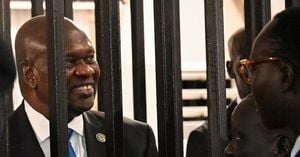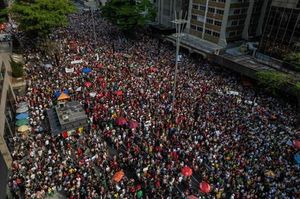On April 3, 2025, popular YouTuber Felipe Neto announced his pre-candidacy for the presidency of Brazil in the 2026 elections, sparking widespread interest and speculation among his millions of followers. The announcement came via a video posted on social media, where Neto, who boasts over 47.2 million subscribers on YouTube and 17 million followers on Instagram, explained his motivations for entering the political arena.
In the video, Neto stated, "I want to be president because, although I am a man from outside politics, I have with me the greatest weapon of our time: the use of social networks." This statement encapsulates his belief in the power of digital platforms to influence public opinion and governance.
Neto emphasized that his decision to run is not driven by vanity but by a genuine desire to serve the public. He remarked, "This is not a gesture of vanity, as I have built a financial and communicative legacy that sustains me for life." His comments reflect a significant shift from his previous stance, where he had distanced himself from politics, claiming a need for an "outside perspective" on Brazil's challenges.
In a notable twist, Neto also announced the launch of a new social network called 'Nova Fala.' He described this platform as a "laboratory" where citizens can voluntarily share their preferences and needs, thereby creating a more informed governance model. "Why not use the dependence on networks in favor of the people?" he questioned, highlighting his vision for a more engaged and transparent political process.
The launch of 'Nova Fala' is particularly intriguing, as Neto likened it to a "ministry of truth," aiming to better understand and address the population's needs. He stated, "All platforms have access to our tastes, interests, and ideologies; there is no escape. So why not use this to benefit the people?" This approach suggests a novel integration of social media dynamics into political discourse.
Felipe Neto's announcement follows a series of political maneuvers in Brazil, including a recent statement from singer Gusttavo Lima, who had also expressed intentions to run for president but later withdrew. Neto's entry into the political landscape raises questions about the role of influencers in politics and the potential impact of social media on electoral outcomes.
Polls conducted prior to Neto's announcement have shown varying scenarios for the upcoming elections. A survey by Futura Inteligência, released on March 26, indicated that if elections were held at that time, current President Luiz Inácio Lula da Silva would lead in only one of three first-round scenarios tested. In contrast, an AtlasIntel/Bloomberg survey from March 7 suggested Lula would win in all first-round scenarios against potential challengers.
Despite his previous support for Lula during the 2022 campaign, Neto's political alignment appears to be evolving. He had openly criticized Lula's choice of Cristiano Zanin for the Supreme Federal Court, indicating that he has no qualms about holding leaders accountable, regardless of his past endorsements. Neto remarked, "Lula has a significant problem with appointing people; it's incredible how he struggles with these choices."
The political landscape in Brazil remains complex, with Neto's candidacy introducing a new dynamic. His ability to mobilize young voters and those disenchanted with traditional political structures could reshape the electoral map. As he prepares for his campaign, more details about his plans and the launch of 'Nova Fala' are expected to be revealed on April 4, 2025, at noon.
As the political climate heats up, Neto's entry into the race is a reminder of the changing nature of politics in the digital age. Influencers like him are increasingly seen as viable candidates, leveraging their platforms to connect with voters in ways that traditional politicians may struggle to achieve. Whether Neto can translate his online popularity into political success remains to be seen, but his announcement has undoubtedly added a fresh layer of intrigue to Brazil's upcoming elections.
In conclusion, Felipe Neto's pre-candidacy marks a significant moment in Brazilian politics, illustrating the intersection of social media and governance. As he embarks on this new journey, the implications of his campaign and the effectiveness of his proposed social network will be closely watched by both supporters and skeptics alike.









